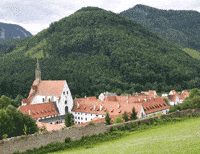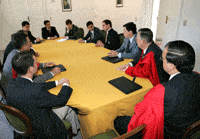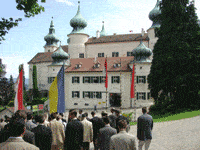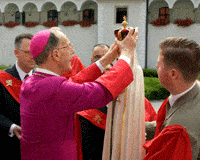
If there is a place to discuss the cultural crisis in Western civilization, the restored fourteenth-century Carthusian Charterhouse in Gaming, Austria is certainly the setting. From its austere origins, the monastery has weathered a number of cultural crises – the Renaissance, the pseudo-Reformation, the Enlightment, communist occupation and the present modern cultural assault.
This rich setting was part of what led the Tradition Family Property (TFP) organizations in France and Austria to host the Fifth International Student Summer Conference (Université d’été) from July 24-29 at this historical location.
The theme this year was “The Scourge of the Cultural Revolution: The Counter-revolutionary Response.” Well over one hundred participants came from Austria, France, Poland, Brazil, Belarus, the United States, Argentina, Chile and several other nations. Bishop Juan Rodolfo Laise, Bishop Emeritus of San Luis (Argentina) was among the honored guests. The International Pilgrim Statue of Our Lady of Fatima graced the event with her presence.

Discussing the Cultural Revolution
Speakers from several TFPs and esteemed guests delivered timely talks which were simultaneously interpreted in six languages. The principal focus of the meetings was analysis based on the book Revolution and Counter-revolution by Prof. Plinio Corrêa de Oliveira. The Cultural Revolution was seen as part of the hippy and sexual Revolution of the sixties that seeks to destroy logical structures, blur distinctions and genders and destroy civilization and tradition.
Thus, topics ranged from the destruction of the nation-state to the homosexual agenda to the effects of cyber-culture. Young members of the American TFP’s Sedes Sapientiae Institute presented a panel discussion on how fashion and culture shape the mentality of youth.
In addition, the TFPs and participants paid a special tribute to Prof. Plinio Corrêa de Oliveira observing the tenth anniversary of his death.

A Cultural Experience
The program was not only academic. Participants experience firsthand Christian civilization which is the proper response to the Cultural Revolution. Whether it be the centuries-old Spanish Riding School, the crypt-cemetery of the Hapsburg dynasty beneath the Capuchin Church in Vienna, or a visit to traditional pastry shop, the rich cultural Catholic tradition of Austria are impressive and inspiring.
At the magnificent St. Stephan’s Cathedral in central Vienna, the TFPs unfurled their large red standards for the first time in the public square.
During a three-hour boat trip up the Danube River, all marveled at charming baroque churches, fairytale villages and medieval castles where one could almost sense the presence of Richard the Lion Hearted who was imprisoned nearby. Indeed, Christianity created a marvelous civilization.

Catholic Atmosphere
Everything was done in a Catholic atmosphere that fit well with the former monastery setting. There was daily Mass where Bishop Laise delivered inspiring sermons. The rosary and the scapular were promoted. All were invited to participate in a prayer vigil before the International Pilgrim Statue of Our Lady of Fatima.
The most impressive aspect of the Université d’été was its unity of purpose. Despite the diverse nationalities and the eight languages spoken, participants were able to unite around the universal ideals of the Counter-revolution. They could discuss their experiences. Study workshops took the abstract principles learned in the talks and applied them to concrete reality. The American and several other TFP delegations discussed their own activities and successes.
In between there were long conversations and lively mealtime talk where new international friendships were forged. Such details pointed to the catholic (as universal) aspect of the counter-revolutionary struggle.
Resolution and Enthusiasm
The summer conference ended all too quickly. On the final day, a special audio-visual presentation on the life of Prof. Plinio Corrêa de Oliveira outlined his life’s work. The inspiring words of H.R.I.H. Prince Luis of Orleans-Braganza officially closed the conference.
The solemn final banquet in the ornate Prelate’s Hall provided an opportunity to reflect on the busy week. Diplomas and presents were distributed. Representatives of the national delegations were invited to give their impressions. Their testimonials spoke of resolution and enthusiasm. Closing remarks by Duke Paul of Oldenburg reminded the participants of the fight ahead and the need to take what they learned back to their native lands.
The Université d’été represents an excellent initiative on the part of the TFP organizations in Europe. Excellent organization and coordination ensured that all could concentrate on the matters at hand. All left convinced of the reality of a destructive cultural revolution and the necessity of a Counter-revolutionary response.

